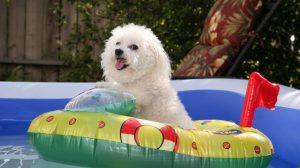The Leonberger is a giant breed of dog that is generally considered gentle, confident, and confident but can also be a bit headstrong. When training and dog sporting the lovable giants, you should make sure that their joints are not put under too much strain – otherwise, however, the clever dogs are happy about any activity that challenges and encourages them both physically and mentally.

To ensure that you and your Leonberger enjoy training and dog sport equally, you should develop a long-lasting, trust-based human-dog friendship. If your dog trusts you and feels safe, he will listen to you better and learn faster. But which dog sports and training methods are particularly suitable for Leonbergers?
Leonbergers love dog sports in the water.
The ancestors of the Leonberger include Newfoundland dogs, which initially served as working animals for Canadian anglers on the island of Newfoundland. Newfoundland dogs and related dog breeds still love water, which is why water work is an almost ideal dog sport for Leonbergers. Your strength and condition will be trained while swimming without putting too much strain on your joints. In addition, the clever animals also have to show their brains when working in the water, which usually gives them great pleasure.
Parts of the water work exercises and tests are, for example, dummy training, groundwork, and retrieving surfboards and other objects. Leonbergers can also be trained as rescue dogs in professional water sports. They then learn to salvage dolls and fetch empty boats, later also to rescue living people. However, if you keep your Leonberger as a family dog, the dummy and retrieval exercises and swimming training are sufficient for species-appropriate activities.
Leonbergers as draft dogs
Its natural strength and endurance ensure that the Leonberger is also suitable as a draft or load-pulling dog. The dog is connected to a carriage or sled via a harness and pulls it like a horse pulls a carriage. It is best to inquire at the dog schools and dog trainers in your area whether they offer draft dog sports – there, you and your four-legged friend will learn everything that a load-pulling dog and his heart person need to know under professional guidance.
We are promoting the intelligence of the Leonberger: Companion dog testing and Co.
So that your Leonberger doesn’t start to get bored, you should also keep him busy mentally and sensually. In training for the companion dog test, your dog learns important rules of basic obedience, self-confidence, and trust in his favorite person. This type of training is suitable and recommended for all dog breeds. Before companion dog training, you can take your puppy to puppy school and puppy playgroups to be with his peers and practice his social needs and skills.
After your Leonberger has successfully passed the companion dog test, you can try other dog sports with him. For example, with nose work and track work, he can train his already fine sense of smell. Those who want to pursue the search for tracks more professionally can also have their clever giant trained as a rescue dog in mantrailing. But other areas of rescue dog sport are also suitable for the Leonberger. You can also deepen the relationship with your four-legged friend with obedience training.
Be careful with agility training with large dogs.
Agility training is all about speed, agility, and jumping power. A Leonberger can also learn this, but you have to consider his joints. These are usually somewhat sensitive in large dog breeds. It is best to avoid big jumps and only start agility when your dog is fully grown – with the Leonberger, this can take two years. When the bones and joints are still growing, they are particularly susceptible to injury. Ask your trusted dog school whether they offer agility courses for large dogs and what else you need to watch out for. Then, in principle, nothing stands in the way of dog sport.








